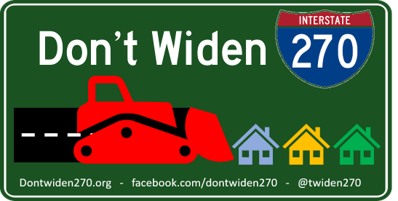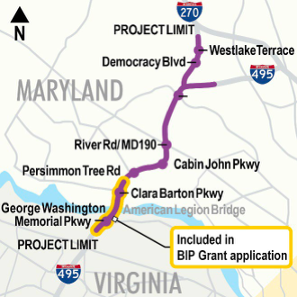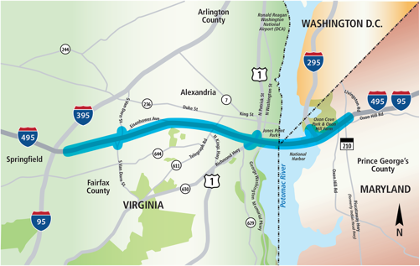Toll Lane Plans – and Big New Risks – Come into Focus
We can stop tracking billion-dollar breadcrumbs now. It’s certain: Maryland Gov. Wes Moore is committed to implementing what is basically Larry Hogan’s toll lane plan. See the latest updates below. Then read about the unprecedented risks posed by the toll lane projects at both ends of our Capital Beltway.
1. On August 1, MDOT asked the Trump administration for a grant to build toll lanes starting from the George Washington Parkway inside VA, across the American Legion Bridge, and up I-495. The grant would cover an initial portion of Phase 1 of the Moore-Hogan toll lane plan (see map below); lower I-270 would be part of a later phase. Although MDOT’s two previous requests for federal grants were turned down – and Moore and Trump are currently in very public disagreement – we can’t necessarily assume the new request will also fail. See State Delegate Marc Korman’s take on the latest grant proposal here. Del. Korman is chair of the House Environment and Transportation Committee.
Portion of Moore-Hogan toll-lane plan covered by current grant application (p. 1).
2. At the other end of the Beltway, Virginia continues pushing to extend its private toll lanes across the Woodrow Wilson Bridge and into Prince George’s County, MD. Despite intense opposition to this Southside project from Maryland jurisdictions, MDOT has not said “No”. The DC region’s Transportation Planning Board will hold a critically important vote on the Southside project on October 15 (see Action Update, below).
Scope of Southside toll lane project into MD
3. Just as both these toll lane projects near crucial stages, Maryland is losing the measured approach of our soon-to-retire MDOT Transportation Secretary Paul Wiedefeld. Sec. Wiedefeld is on record (22:12 to 23:27) strongly questioning public-private partnerships for large highway projects.
4. Judgement is still pending in the Sierra Club/Natural Resources Defense Council/National Trust for Historic Preservation’s legal appeal of the I-495/I-270 toll lane plan.
Looming New Risks
What the Maryland public is facing – in two cases, two places – appears to be unprecedented in the United States: one state building what will likely be private toll lanes inside another state.
In Case 1, the Moore-Hogan plan would have Maryland construct a significant segment of toll lanes in Virginia to connect the VDOT/Transurban I-495 toll lanes to MDOT’s toll lanes over the American Legion Bridge.
In Case 2, the Southside plan would have Virginia building and operating private toll lanes over the Woodrow Wilson Bridge and into Prince George’s County as far as Oxon Hill, MD.
In both cases, Virginia would effectively be moving its existing bottlenecks into Maryland.
MDOT is entering this unprecedented situation with no agreement in place to protect the Maryland public.
Maryland and Virginia appear to have created no formal bi-state toll lane agreements to address, at a minimum, how they will safeguard the public interest while navigating differences in their states’ regulatory, legal, financial, and governance requirements.
Without a public-protecting agreement, Maryland will be at huge risk and potentially significant disadvantage if/when MDOT heads into negotiations with Virginia and its for-profit partner.
Here are some of the reasons why: In Case 1 (the Moore-Hogan toll lanes), VDOT controls the underlying infrastructure, built the toll lanes that MDOT must connect to, and has the existing agreement with private partner Transurban. In Case 2 (the Southside toll lanes), VDOT has said at multiple information sessions that major issues will be decided in negotiations between VDOT and its contractor after the project is approved. MDOT apparently will not be at the table, even though the toll lanes will be built in Maryland.
Action Update: Stop These High-Risk Plans
A broad and growing advocacy coalition is actively opposing these toll lane plans that would limit – for generations – Maryland governors’ ability to make transportation policy in the public interest. As Sec. Wiedefeld said of such public-private partnerships for highways, “…you give up a lot of the ability to control the future…And you're doing it at a cost” (minutes 22:12 to 23:27).
Most immediately, our coalition and elected allies are focused on preventing approval of the Southside toll lane project at the DC region’s Transportation Planning Board meeting on October 15.
As we get closer to the October 15 vote, watch for action alerts from DontWiden270.org, telling how you can make your voice heard. Also, sign up for notifications from our trusted partners Citizens Against Beltway Expansion, the Maryland Sierra Club, the Coalition for Smarter Growth, and the Action Committee for Transit. Thank you!


